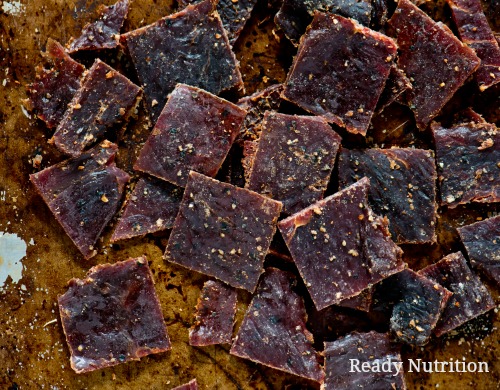
This poses the following conditions for the food: it must be pre-cooked or prepared previously so that no heating or preparation is required. The biggest problem with this is in the winter months, but we’ll address that issue later. Let’s look at some foods that it would not be an inconvenience to tote around, either on your person or in a small bag or even a briefcase. Remember, we’re looking for high protein, medium carbs, and low fat. Here we go:
5 Quick Emergency Foods
- Beef Jerky/Smoked, Cured Jerky and meats: In general, you receive a lot with jerky and beef sticks…on average a 1-ounce portion or piece/stick is about 10-12 g of protein. Considering that it keeps for a long time and doesn’t need to be cooked, with just about a quarter of a pound, you are taking in 40-48 g of protein. This is very good, especially in a high-stress environment where you’re burning up a lot of energy. Please go back and refer to some of my articles on protein intake and how “cannibalism” (during the catabolic phase) to break down muscle tissue and use it for energy works.
- Nuts: Peanuts, almonds, sunflower seeds, and so forth, usually run about 7-8 grams of protein, about the same in carbohydrates, and double the amount in fat. They have a high-fat content; however, nuts are packed with resveratrol, a chemical that is a vasodilator that improves circulation. In addition, during a disaster, the extra fat content will not be harmful, as it provides satiety (feeling of fullness), as well as giving you some valuable electrolytes, such as sodium and potassium. These, too are readily available and easily “munched” down on the go. Dry-roasted, shelled pistachios are a good one with high protein and high Omega’s, as well as the minerals and electrolytes.
- Dried Fruits: will give you some simple sugars and carbohydrates for the body. Long-term benefits will be to provide some fiber. This is very important in a disaster, as peristaltic activity (the activity of the bowels in digestion) tends to slow down and become depressed substantially with stress. This results in constipation and hardened stools that can cause cramps and discomfort and even lead to a major problem, such as a blockage, as in the condition called obstructed ileus. Some examples of dried fruits good to pack with you are figs, apricots, raisins, cranberries, and prunes…the latter being the best for prevention of constipation when used in moderate amounts. Prunes are also extremely high in Potassium, a vital electrolyte.
- Fruit/Granola/Power “Bars”: These can be pretty good for quick energy and some carbohydrates and fiber. They are not necessarily high in the protein department, except if they’re specified for such. Keep in mind: they’re not meant to serve as long-term meal substitutes, but instead are for a quick energy food for convenience.
- Protein Powders – Milk and eggs are a few of the first foods to disappear before and following a disaster. We need supplements to make up for the lack of nutrients in our diets and also to “boost” our intake of needed materials. Nutrients such as amino acids and protein, which I have written extensively about in previous articles. These are critical for our upkeep, and they must be obtained from our food. A protein powder may or may not (or may partially) provide these amino acids. Of particular importance are BCAA’s (Branched-Chain Amino Acids), such as L-Isoleucine, L-Leucine, and L-Valine. These guys are very important for tissue repair. Read more on protein powders here.
It is critical to remember that you must drink water if you’re going to eat all these things. Dried foods (and any food, for that matter) will suck the fluids right out of you if you don’t take in liquid. These foods just mentioned can come in their own wrappers, or you can buy them in bulk and transfer them to plastic bags to tote with you for when the need arises. It’s a simple thing to be able to throw them down without any effort, whether you’re in a fighting position overlooking a section of your property or in a pouring rainstorm trudging up a hill. Apportion them accordingly, and take some of each item for a well-balanced meal that will do in a pinch.
This article was originally published at Ready Nutrition™ on September 20th, 2017






